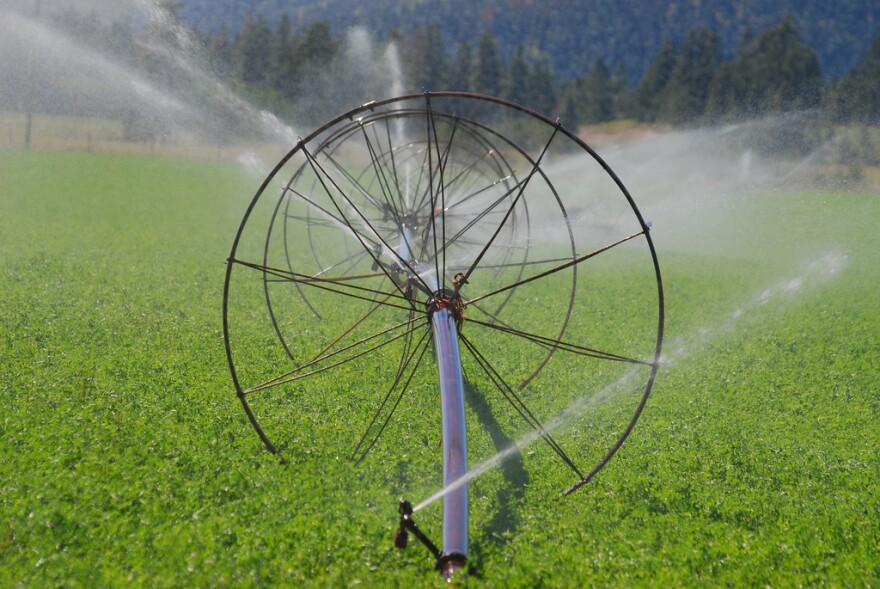Some of Montana’s most influential agriculture organizations are lining up to support the Flathead water compact.
Yesterday the Montana Stockgrowers Association said it endorses the compact, which is a negotiated settlement between state and federal government and the Confederated Salish and Kootenai Tribes. Right now, ownership of water on the reservation is disputed, and the compact is an attempt to codify who owns and controls the water without having to go to court.
"The negotiated settlement is more favorable than any potential litigation that may result," says Jay Bodner, natural resources director for the Montana Stockgrowers.
Opponents of the compact include some farmers and ranchers in the Flathead valley who say that passing it would change the status quo. An association of irrigators called the Flathead Joint Board of Control says it owns water that would be given to the Confederated Salish and Kootenai tribes if the compact is approved, and that irrigators would be better off going to court and trying get those rights awarded to them there. They and two members of the Flathead County Board of Commissioners are lobbying state leaders to abandon the compact.
But the Stockgrowers’ Bodner says its 2,500 members have spent the last two years studying the Flathead Compact, and wouldn’t back something that caused radical changes.
"We support a negotiated agreement, as long as it supports those historic uses on and off the reservation."
The Montana Farm Bureau Federation and the Montana Water Resources Association are joining the Stockgrowers in supporting the Flathead compact. A new group has formed specifically to help pass the compact, it’s called FARM, Farmers and Ranchers for Montana.
Big Timber Rancher Lorents Grosfield is a FARM co-chair. The former three-term Republican state legislator says that ag groups backing the Flathead compact is a switch from when it came before the state legislature in 2013.
"It’s a switch in the sense that they’ve come out very strongly in support of this compact. The previous compact in 2013 did not really have a lot of publicity about it. It just came out, and some people decided it was too complicated, or whatever reason they opposed it, and it didn’t pass. This session, one of the main reasons that these groups are supporting it is to try to educate people about what’s really in it."
Groups opposed to and in favor of the compact both say that people should leave politics aside, read the compact and decide based on the facts. And both sides are backing public education efforts now, before the compact has even been formally introduced in the state legislature.
That’s why Lake County Democrats and Republicans are hosting a public presentation Thursday night on the Salish Kootenai College campus. Both state and tribal legal experts will be on hand to answer questions.
Lake County Republican Women’s Club President Susan Lake hopes residents will come and hear legal experts explain water compact issues for themselves instead of simply relying on media reports which she says haven’t been very in-depth.
“I think there’s been a lot of windshield wiper reporting done by the media. When somebody comes to a meeting and the information that the people down in the trenches gets kinda lost. The proponents sit down and listen to the presentation. The opponents get up and tell their story. And so when the media comes to report it, and they report is what they saw at the meeting."
Craig McClure is vice chairman of the Lake County Democratic Committee. He agrees that both Democrats and Republicans are interested in educating the public together. Lake County residents he talks to are enthusiastic about the joint meeting.
“When they read these notices of this joint meeting and they see the flyers noting that Republicans are working with the Democrats, it’s been very interesting. I think folks have been very excited about that," McClure said.
Both Lake and McClure say increasing civil dialog between the parties is important and Lake believes legislators need to do better.
“It looks ugly. It looks ugly on a national level. It looks ugly on a state level," said Lake. "And basically one thing that’s very important for everybody to understand about this compact is this is not a partisan issue."
McClure wants to organize similar joint-meetings to make it easier for all Lake County residents to educate themselves on other important issues in the future.
The Confederated Salish and Kootenai water compact presentation begins at 6:30 Thursday night at the Salish Kootenai College Theatre in Pablo.







